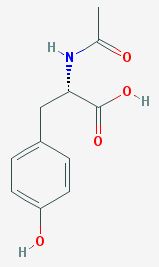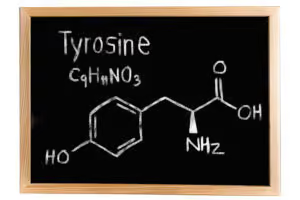Table of Contents
N-Acetyl L-Tyrosine (NALT or NAT) is a highly bio-available form of the amino acid L-Tyrosine. Your brain uses the enzyme tyrosine hydroxylase to convert L-Tyrosine into L-DOPA. Decarboxylation of L-DOPA results in synthesis of the neurotransmitter dopamine.[i]
Once converted into dopamine, the enzyme dopamine-beta-hydroxylase converts it into the neurotransmitters norepinephrine (noradrenaline) and epinephrine (adrenaline). This triad of neurotransmitters are collectively referred to as “catecholamines”.
N-Acetyl L-Tyrosine can be a highly effective nootropic for boosting cognitive function. And is particularly helpful in maintaining cognitive performance when you’re under practically any kind of stress. Including music played above 90 dB’s.
N-Acetyl L-Tyrosine works in synergy with stimulants like methylphenidate (i.e. Ritalin).[ii] Drugs like Ritalin work by blocking the reuptake of the neurotransmitters dopamine, and norepinephrine. And if there’s not enough dopamine available to do the job, Ritalin doesn’t work very well. NALT potentiates increases in extracellular dopamine.
NALT also stimulates the production of thyroid hormones T3 (triiodothyronine) and T4 (thyroxine) which are crucial in maintaining both overall physical and cognitive health.
NALT can boost libido, memory, focus, concentration, mood, offers anti-depressant effects, and improves executive function in those with ADHD.
N-Acetyl L-Tyrosine helps:
- Cognitive Stress. NALT produces the catecholamine-triad of neurotransmitters dopamine, norepinephrine and epinephrine. Sleep deprivation and extreme stressors like heat and cold can deplete catecholamine levels. NALT restores them to preserve optimal cognition.[iii]
- Neurotransmitters. NALT is a necessary precursor for dopamine, norepinephrine and epinephrine. As your dopamine levels increase, you’re better able to concentrate, organize your thoughts, and stay productive.
- Attention Deficit Disorder (ADHD). NALT can be an effective treatment for ADHD symptoms. NALT works in synergy with pharmaceutical drugs like Ritalin and Adderall by boosting extracellular levels of dopamine. Helping these drugs be more effective. And mitigating side effects like crashes when the drug wears off.
Overview
N-Acetyl L-Tyrosine (NALT) is a form of the amino acid L-Tyrosine. The addition of an acetyl group to L-Tyrosine makes it more bioavailable than supplementing with L-Tyrosine.

Your brain converts L-Tyrosine to L-DOPA which then produces the neurotransmitter dopamine. The unused dopamine is then further converted into the neurotransmitters norepinephrine (noradrenaline) and epinephrine (adrenaline). This triad of neurotransmitters are collectively referred to as “catecholamines”.
“Tyrosine” is derived from the Greek word tyros, meaning cheese. It was first discovered by German chemist Justus von Liebig in 1846 in the protein casein from cheese.
Tyrosine is considered a non-essential amino acid because it can be synthesized in your body from phenylalanine. Which is found in many high-protein foods such as poultry, fish, dairy, nuts, soy products, lima beans, avocados and bananas.
NALT enhances working memory and executive function in the prefrontal cortex. It helps with creative flow states, is fuel for inspiration, cognitive flexibility, and the kind of “convergent thinking” you do in multiple choice exams.
N-Acetyl L-Tyrosine assists in the production of thyroid hormones T3 (triiodothyronine) and T4 (thyroxine) which are crucial in maintaining both overall physical and cognitive health.
N-Acetyl L-Tyrosine (NALT) vs. L-Tyrosine: What’s the Difference?
 N-Acetyl L-Tyrosine (NALT) is the amino acid L-Tyrosine with an acetyl group added. When you take NALT as a supplement, it breaks down in your kidneys back into L-Tyrosine. So in theory, the two supplements offer the same benefits.
N-Acetyl L-Tyrosine (NALT) is the amino acid L-Tyrosine with an acetyl group added. When you take NALT as a supplement, it breaks down in your kidneys back into L-Tyrosine. So in theory, the two supplements offer the same benefits.
There is some debate in the nootropics community on which is more effective. NALT or plain L-Tyrosine. NALT is a more soluble form of L-Tyrosine so it should be more bioavailable to your body.
However, some studies report that in some cases, a sizeable percentage of supplemental NALT is excreted in urine before it’s converted into L-Tyrosine.[iv]
On a personal note, I haven’t had any issues using NALT as a source of L-Tyrosine. It gives me a dopamine and adrenal boost you’d expect from supplementing with a dopamine precursor.
When dealing with ADHD/ADD it’s particularly effective when stacked with ALCAR (Acetyl-L-Carnitine). ALCAR easily crosses the blood-brain barrier for boosting acetylcholine levels. And seems to positively influence serotonin levels. And NALT provides my brain with the dopamine it needs to mitigate symptoms of ADHD/ADD.
But in the interests of full transparency, this is stacked with 20 mg of Ritalin twice a day. Clearly, my brain doesn’t have the capacity to produce enough dopamine on its own. And needs the boost that comes from supplementing with NALT.
So like all nootropics, YMMV. Always take into account how each nootropic works synergistically with others in your stack. And how they work with any meds you need to take.
This is as much art as it is science. And experimentation is key for optimal cognition, and a ‘Limitless’ mindset.
How does N-Acetyl L-Tyrosine work in the Brain?
N-Acetyl L-Tyrosine boosts brain health and function in several ways. But two in particular stand out.
- N-Acetyl L-Tyrosine improves memory and cognition under acute stress. Acute stress is defined as short-term stressors that can affect cognition. Examples are extreme heat or cold. Things like cold showers, extreme sports, car accidents, relationship problems, intense movies, business deals gone awry, exams and war zones.
In one study done at the University of Bedfordshire in the UK, the effect of L-Tyrosine on cognitive performance was measured before an exercise task.
Researchers recruited 8 soccer players. And had them complete a 90-minute soccer simulation performance test in an environmental chamber set at 77 degrees Fahrenheit.
The soccer players were given either L-Tyrosine before exercise or a placebo. Cognitive performance was measured before the exercise task. Then again at “half-time”, following half time, and following the entire simulation.
The cognitive performance task assessed dual-task and vigilance. The outcome revealed that cognitive vigilance and reaction time among soccer players significantly improved following administration of L-Tyrosine.
Results showed that in warm-weather conditions, L-Tyrosine could enhance cognitive function and prevent cognitive impairment during exposure to exercise-heat stress.[v]
- N-Acetyl L-Tyrosine boosts neurotransmitters. NALT turns into L-Tyrosine once taken as a supplement. It then converts into the neurotransmitter dopamine. Dopamine is used to control movement in your body, is fundamental to memory, attention and problem solving.
The unused dopamine can then convert into the neurotransmitters norepinephrine (noradrenaline) and epinephrine (adrenaline).
Norepinephrine is important for attentiveness, emotions, sleeping, dreaming and learning.
Epinephrine drives your ‘flight-or-flight’ response. It’s what prompts your reaction to dangerous circumstances, emergency situations, or in stressful situations or environments.
In one study done in the Netherlands, researchers determined if L-Tyrosine would boost cognitive resources associated with cognitive control. They performed tests designed to measure “working memory” using the N-Back Test.
Study participants were assigned to engage in a “1-back” condition of easy difficulty and then a 2-back condition of tougher difficulty. Those that used L-Tyrosine demonstrated superior performance in the 2-back test, but not the 1-back test.
The study authors suggested that L-Tyrosine provides greater cognitive enhancement when cognitive demand increases. The bottom-line; supplementation of L-Tyrosine may help you increase your IQ score due to maximizing catecholamine reserves.[vi]
How things go bad:
As we get older, our brain and body chemistry and energy metabolism changes.
↓ Dopaminergic neurons are damaged or die
↓ Neurotransmitter levels decline
↓ Thyroid hormones decline
↑ Stress levels increase
↓ Working memory and mood decline
All of these changes are often attributed to aging. But could be a result of dietary and lifestyle choices. Unchecked, they could lead to neurodegenerative diseases like Parkinson’s, a drop in quality of life and depression.
N-Acetyl L-Tyrosine benefits
N-Acetyl L-Tyrosine (NALT) can boost levels of the neurotransmitters dopamine, norepinephrine and epinephrine. And can help a sluggish thyroid produce more T4 and T3.
 NALT can help boost cognition especially in stressful situations. It helps improve decision making, ‘flow state’ and creativity, cognitive flexibility, and working memory.
NALT can help boost cognition especially in stressful situations. It helps improve decision making, ‘flow state’ and creativity, cognitive flexibility, and working memory.
NALT converts into L-Tyrosine which then converts into L-DOPA to produce dopamine. L-DOPA is also used to make melanin in your body. This conversion process helps in the removal of neurotoxic quinones. And chelates heavy metals like mercury and lead which can accumulate in and damage neurons.
The dopamine that is not used by your brain is available to produce norepinephrine (noradrenaline) which is important for attentiveness, emotions, sleeping, dreaming and learning.
NALT can be an effective nootropic when stacked with ADHD/ADD meds like Ritalin or Adderall. It helps supply extracellular dopamine needed to improve the effectiveness of stimulants used to boost the uptake of dopamine in your brain.
How does N-Acetyl L-Tyrosine feel?
Keep in mind that NALT is a precursor to catecholamines. So if you’re not ‘low’ on dopamine, norepinephrine or epinephrine – you may not ‘feel’ anything.
Many neurohackers report a lift in mood, better focus, concentration, increased energy, and an overall sense of well-being. NALT can help re-adjust your motivation levels. It can help lower anxiety levels, especially social anxiety.
Supplementing with N-Acetyl L-Tyrosine can help bring your blood pressure down if it’s elevated from a stressful situation or environment. Take it before the stressful event if you can.
NALT helps buffer the effects of stimulants like caffeine or amphetamines. It helps potentiate and prolong the effects of Ritalin or Adderall, and reduces the crash.
If you’re into athletics or do manual work, you’ll find that supplementing with NALT before a workout or construction job will leave you feeling great afterwards. It helps mitigate many of the effects of acute stress caused by short-term stressors.
And NALT helps your body to produce melanin, so you may find it easier to get a tan while at the beach.
N-Acetyl L-Tyrosine Clinical Research
N-Acetyl L-Tyrosine to treat ADHD
Several studies have investigated using L-Tyrosine for the treatment of ADHD. One informal study published in the 1980’s determined that L-Tyrosine resulted in short-term relief from ADHD symptoms. But subjects eventually reached tolerance and a diminished effect.
This is important for neurohackers to keep in mind. It seems that NALT on its own can benefit some more than others. Regardless if your treating ADHD, or are perfectly cognitively healthy.
I’ve seen more than one report of nootropic users experiencing tolerance after just a week of supplementing with NALT. But most peer-reviewed, published studies show positive results.
One study published in Neuropsychiatric Disease and Treatment in 2011 looked at using amino acid precursors for the treatment of ADHD. Including L-Tyrosine for dopamine, and 5-HTP for serotonin.
The study used 85 young people aged 4 – 18 years old, all with a clinical diagnosis of ADHD. They were treated for an initial period of 8 – 10 weeks. Urinary samples to determine serotonin and dopamine levels were collected within the first 4 weeks. If they didn’t reach adequate levels, subjects were moved to higher dosing levels 2 and then 3 until they got relief from symptoms.
Researchers found that the dopamine and serotonin precursors yielded similar results to Strattera and Ritalin. And “the amino acid protocol may be equal in efficacy to potent, pharmaceutical ADHD medications”.[vii]
L-Tyrosine reduces blood pressure under stress
This study is particularly interesting for its nootropic application. It’s commonly understood that blood pressure rises when we’re under stress. The source of stress doesn’t really matter. Stress up = blood pressure up.
A study in Amsterdam showed that L-Tyrosine administration decreased blood pressure about 15 minutes after ingestion. This study involved assessing task performance following acute stress.
Acute stress is usually short-term and can be caused by driving, fighting, athletics, martial arts training, war, combat training, Crossfit, cold showers, loud music, intense movies, loud noises, business deals, relationships, school, exams and more.
The point is, this study is applicable to every one of us. The study found that L-Tyrosine reduced diastolic blood pressure within 15 minutes of taking the supplement. And blood pressure normalized within 1 hour.
This study tells us that L-Tyrosine (and NALT) may promote a decrease in blood pressure caused by stress. And could be used to mitigate the effects of stressful situations if taken prior to the stressful event.[viii]
N-Acetyl L-Tyrosine promotes cognitive flexibility
Cognitive flexibility applies to those who can adjust their thinking quickly to adapt to novel situations and stimuli. A high degree of cognitive flexibility is associated with increased fluid intelligence, superior reading and comprehension, and a healthier brain.
Recent research (2015) supports the idea that L-Tyrosine (and NALT) promotes cognitive flexibility. In this trial, researchers recruited 22 adults. And setup a double-blind, placebo-controlled study.
All subjects were assigned a task switching procedure to measure their flexibility. The results showed that receiving L-Tyrosine supplements increased cognitive flexibility compared to the placebo group. The researchers determined that “L-Tyrosine can facilitate cognitive flexibility by repleting cognitive resources”.[ix]
The team observed that increased cognitive flexibility was likely due to a boost in dopamine concentrations. They noted that L-Tyrosine enhanced usage of various cognitive resources. And one way to increase your cognitive flexibility would be to start supplementing with N-Acetyl L-Tyrosine.
It stands to reason that people who are close-minded, set it their ways, are resistant to change and can’t cope with unexpected stimuli or situations have “cognitive rigidity”. And it’s likely due to suboptimal dopamine levels.
N-Acetyl L-Tyrosine Dosage
N-Acetyl L-Tyrosine (NALT) suggested dosage for cognitive benefit is 350 – 500 mg twice per day.
NALT is water-soluble so you don’t have to take it “with a meal” or healthy fat like some nootropics.
You may find your body responds to smaller doses. Or even more if you are stacking it with stimulants like ADHD meds. Listen to your body and see how you react.
N-Acetyl L-Tyrosine Side Effects
NALT quickly turns into the non-essential amino acid L-Tyrosine once you take it. So is considered non-toxic and very safe. Most neurohackers don’t have any negative side effects.
At higher doses there are reports of stomach issues and migraines. Migraine problems usually happen to those who already suffer from migraines. This may be an indication that your neurotransmitter levels are already optimal and you don’t need to supplement with NALT.
NALT can increase your thyroid hormones. So if you’re hyperthyroid you shouldn’t use NALT.
And if you’re taking MAO inhibitors (MAOI’s) like selegiline, Azilect, Marplan or Nardil you should not use NALT. MAOI’s work in your brain and effect neurotransmitters. So using NALT in combination with MAOI’s could throw off the delicate balance of neurotransmitters needed for optimal brain health and cognition.
Where to buy N-Acetyl L-Tyrosine
N-Acetyl L-Tyrosine is available in powder, capsule and tablet form. Capsules and tablets are usually 300 – 500 mg.
Some pre-made nootropic stacks and workout stacks also include NALT as part of their formula. For example, Click for Mind Lab Pro® contains 11 brain enhancing nootropic compounds including N-Acetyl L-Tyrosine.
I recommend Mind Lab Pro because it addresses all aspects of anxiety resistance, memory and cognitive enhancement, stabilizes mood, brain repair, and maintenance.
This premium nootropic stack is designed to affect neurotransmitters, cognitive energy, brain waves, neuroprotection, and regeneration. See my Mind Lab Pro review for a detailed report.
Ensure you read labels carefully, and stick with manufacturers who follow Good Manufacturing Practices (GMP). And are GMP-Certified.
Nootropics Expert Recommendation
N-Acetyl L-Tyrosine (NALT) 350 – 500 mg twice per day
 I recommend using N-Acetyl L-Tyrosine (NALT) as a nootropic supplement.
I recommend using N-Acetyl L-Tyrosine (NALT) as a nootropic supplement.
Your body does synthesize some L-Tyrosine from phenylalanine which comes from high-protein foods like chicken, fish, almonds, avocados and bananas.
But most of us don’t get enough L-Tyrosine from our diet. So supplementation will help. And N-Acetyl L-Tyrosine is a highly bioavailable form of L-Tyrosine. So you should feel its effects faster.
NALT is helpful for most neurohackers to combat stress and sleep deprivation. It’ll boost dopamine, norepinephrine and epinephrine levels.
It’s particularly helpful if you take NALT prior to a stressful situation, workout or physically demanding job.
NALT is especially helpful to those dealing with ADHD/ADD. It’s a great compliment to stack with stimulant meds like Ritalin or Adderall. NALT will provide the dopamine your brain needs. It will help smooth out and prolong the effects of stimulant meds. And help prevent the associated crash when they wear off.
A good stack for ADHD is using your usual med dose with NALT 500 mg and ALCAR 500 mg.
You can buy individual N-Acetyl-L-Tyrosine supplements. Or you could try my favorite pre-formulated nootropic stack Click for Mind Lab Pro® which includes NALT.
Mind Lab Pro contains a synergistic blend of 11 brain enhancing nootropics covering all aspects of cognition and brain health. See my full Mind Lab Pro review for more.
You can safely use up to 1,500 mg per day when stacking with ADHD meds. But dosed throughout your day.








Join The Discussion - 203 comments
ZEY
March 14, 2019
PLEASE could you recommend a good brand oF NALT and ALCAR
David Tomen
March 14, 2019
Zey, I get my NALT as an ingredient in Mind Lab Pro. And ALCAR as an ingredient in Performance Lab Energy. As standalone supplements I also make NALT capsules from powder I get from Bulk Supplements (https://amzn.to/2CmtDp8), and separate ALCAR capsules from NutriCost (https://amzn.to/2XXDMBZ).
ZEY
March 14, 2019
iHerb ships to me, however, I’m not sure which of the brands on their site are good?
David Tomen
March 14, 2019
Zey, Source Naturals, Doctor’s Best, NOW Foods and Jarrow are all good brands. But please check the label of each supplement no matter who the manufacturer is and do your best to avoid additives. You want as pure of a supplement as you can find.
You may need to go directly to the manufacturer’s website to find a copy of the relevant label. But it’s well worth the effort and time. The best supplements have only the ingredient you want and the capsule. Nothing else.
ZEY
March 22, 2019
Thanks for the response. The ingredients in;
Doctor’s Best are – 500MG ALCAR from BIOSNT HCI and magnesium silicate, micro-cyrstalline cellulose, modified cellulose (vegetarian) silicon dioxide and stearic acid
NOW foods are – 500mg ALCAR from HCI
and Hypromellose (cellulose capsule), Magnesium Stearate (vegetable source) and Stearic Acid (vegetable source).
Source Naturals are – 500mg ALCAR, 40MG calcium, 150mg Alpha lipoic acid and Silicified microcrystalline cellulose, dibasic calcium phosphate, stearic acid, colloidal silicon dioxide, and magnesium stearate.
These are the ingredients listed on the labels. Which of the 3 is the best/most natural? I’m not sure which ingredients to look out for when it comes to supplements.
Thanks!
David Tomen
March 23, 2019
Zey, that’s what I was afraid of. It’s not necessary to have any of these other ingredients in these supplements. You can get pure ALCAR in a capsule, or order the powder and make your own capsules.
Please see my post on buying quality supplements here: https://nootropicsexpert.com/7-tips-for-choosing-the-highest-quality-nootropic-supplements/
Adam
January 1, 2019
Hi David,
What brand of NALT do you use? I see you take 500 mg 4x/day, but is this as a capsule? I want to reduce the number of capsules I take in a day, and I currently take 700 mg 3x/day, 2 capsules each dose. So do you know of a high quality, reputable brand that sells NALT capsules containing 5-800 mg each? Thanks!
David Tomen
January 2, 2019
Adam, I’ve been making my own capsules using powder I get from Bulk Supplements here in the USA.
Cari
February 8, 2020
Hi David,
Thanks again for all this great information. You have commented that you make your own capsules for some supplements. Do you have recommendations for a capsule making device and capsule sizes? I want to make my own too, but unsure where to start. I do have a small scale.
Thank you!
David Tomen
February 9, 2020
Cari, I’ve tried at least four different brands of capsules and now use these: https://amzn.to/2SaaYFx. They are pre-separated “00” gelatin capsules. The same company offers veggie capsules as well I think if that is your preference. All the others I’ve tried consistently come with broken or mis-shaped or brittle capsules that break easily while filling them.
For the first 10 years (I can’t believe I didn’t wake up sooner) I used a little capsule machine that made 24 capsules at a time. Now I can make 100 capsules in about 10 minutes using this machine: https://amzn.to/37d6Oku.
I haven’t yet made a video on how to make capsules. So please search YouTube for a how-to video. I think a couple of the manufacturers of these machines also link to YouTube videos from their site.
I put the machine in a 12 in. X 12 in. square plastic tray from the dollar store so powder doesn’t get all over the place. And dump the 100 filled capsules onto a paper plate which makes it easy to pour into an empty supplement bottle.
Once you get accustomed to making capsules you’ll find you no longer need your scale. Because depending on how you fill them, they’ll consistently be from 500 – 750 mg each.
Cari
February 10, 2020
Thank you so much!
Matthew
November 28, 2018
Hi,
I am starting to built a stack for ADHD & Depression and I found NALT and Rhodiola listed in your ADHD Post.
I am wondering if it is safe to combine NALT and Rhodiola since it works as a MaoI?
Thanks,
Matthew
David Tomen
November 28, 2018
Matthew, it’s not only safe but works in synergy because Rhodiola helps NALT work better. You’ll find them stacked together in some of the best nootropic stacks including Mind Lab Pro.
Thiago Lopes Lima
October 11, 2018
Hello, congratulations for the content, you have my admiration.
My doubts are as follows:
I do not have the financial conditions to buy the most diverse nootropics I recommend, here in Brazil we do not have most of them, so I have to import it, it’s even more expensive this way. I would like to know which are the 3 essential nootropics that recommends for those who study and need focus and energy.
David Tomen
October 12, 2018
Thiago, if budget and importing nootropics is a factor then I’d say L-Tyrosine, ALCAR and unrefined coconut oil or MCT Oil.
Gabriella
October 6, 2018
Hi David,
Thanks for directing me to NALT as a possible addition to my stack.
I’ve studied NALT and see that it stimulates T 3 and 4 thyroid hormones. So my question is, can NALT be taken safely without concerns about over stimulating the thyroid and perhaps over time causing a permanent increase in these hormones?
I ask because my thyroid was tested a few months back during a routine checkup. And it’s functioning perfectly. I know the frustration an overactive thyroid can cause after seeing my friend go through hyperthyroidism. And wouldn’t like to break something that’s working.
What are your thoughts on overstimulation? And also can overstimulation cause permanent changes in T 3 and 4 hormone levels?
David Tomen
October 7, 2018
Gabriella, it really depends on the person and your body chemistry. I’m hypothyroid and use NP Thyroid 4-times per day. And use NALT or L-Tyrosine 3-times per day with no problem.
NALT is not going to have the same effect as using a thyroid medication. It’s just something you need to be aware of. And if you want to be extra careful then have your thyroid labs done a month after using NALT and see what it says.
milton bradley
September 8, 2018
hello, i have a question regarding this idea like, take amino based supplements on an empty stomach so they do not compete with food proteins for transport to the brain….what about other amino supplements?? i have not seen any info about this anywhere…..for example if i took, phenylalanine, NALT, ALCAR, agmatine, theanine, and 5htp at once…on an empty stomach first of the day, you think that stack would make a bottleneck or start working against itself?
it is relatively low/average doses of each, i generally like to mix more things to give the body better chance to choose and fill what it needs most but i got wondering where the line is exactly for good synergy.
thank you for all the great info!
David Tomen
September 9, 2018
Milton, I take my stack all at once as well. The biggest competitor for these amino acid transporters is that provided by food. You digestive system needs to do a lot more work dealing with breaking down food. But not nearly as much work with pure supplements.
I think your mixing philosophy is sound. There’s only so much we can do and then let the body’s natural intelligence take care of the rest.
Graeme
August 19, 2018
Hi David,
Ive recently purchased your book and think its great. I am also adult ADHD, taking dexamphetamine (in Australia) and am very interested in what you are taking and testing them on myself. Ive ordered the Performance Lab multi and energy and Mid Lab Pro, waiting for them to arive.
Im having trouble finding NALT to buy. Iherb only has one, Jarrow Formulas, N-Acetyl Tyrosine (is this the same as N-Acetyl-L-Tyrosine)? On Jarrow’s website it says it is USP grade, which I have read on your site to avoid. The capsules consists of bovine gelatin, which doesnt sound good.
Do you have any suggestions please.
Thanks
Graeme
David Tomen
August 19, 2018
Graeme, this is what I currently use: https://nootropicsexpert.com/what-i-take/
You can use either N-Acetyl L-Tyrosine or L-Tyrosine. I’ve had a good experience with both but some find one works better than the other. So you may want to try both.
I’ve found that USP grade vitamins and minerals are often synthetic. For example, you can have a USP grade mineral that is ground up rock. And not the chelated type your body needs. USP grade NALT is a marketing ploy and doesn’t apply to amino acids like NALT.
Performance Lab and Mind Lab Pro use Plantcaps which are made from tapioca. Standard vegetarian capsules are a semi-synthetic polymer made from wood pulp. If had to choose between veggie capsules and bovine gelatin capsules I’d choose the gelatin capsules. Preferably made from grass-fed beef and non-GMO.
The key to making my ADHD protocol work is consistency, timing, and correct dosage.
Charles
November 9, 2019
Hi David, I am in the same boat at Graeme. All I could get my hands on (for a half decent price) was Jarrow Formulas, N-Acetyl Tyrosine (is this the same as N-Acetyl-L-Tyrosine)? I’m still waiting for it in the mail so will try it when it arrives, but should it help at all in the ways NALT is supposed to?
David Tomen
November 9, 2019
Charles, there are a couple of different ways people spell N-Acetyl L-Tyrosine. And you’ve found them. Both are NALT for short. It’s just L-Tyrosine with an acetyl-group added to improve bioavailability.
Jarrow is a good company. And I’ve noticed they’ve started to pay more attention lately to the “other ingredients” they add to their supplements. The fewer the better. But NALT is NALT and if your brain needs more dopamine then this is the nootropic for you.
Mirka
July 14, 2018
Hello,
First of – thank you for this incredible website 🙂
I have a question L-Tyrosine in another context – is it safe if I’m taking caprylic acid?
I’m battling Candida at the moment and looking for sth to boost my mood and performance/ energy levels and since my recommendation is to move my diet from sugars towards protein/ amino acids, I was thinking L-Tyrosine was looking great.. do you know about any known interactions between the two?
I will be grateful for the answer and any recommendations that you may have.
David Tomen
July 15, 2018
Mirka, have you tried Oregano Oil for candida? Labs showed I was dealing with candida. I used Oregano Oil daily and within a month candida was gone.
I use L-Tyrosine with caprylic acid 3-times per day and it works great.
Mirka
August 1, 2018
Hello David,
I’m after two weeks of using a combination of caprylic acid with L-Tyrosine and I feel really good 🙂 L-Tyrosine gave me a boost, and I needed it because when I started taking caprylic acid and changed my diet I felt tired all the time. My doctor said it may have been due to my body purging from dead candida and recovering from sugar addiction.
It feels much better now 🙂
I bought oregano oil and started having it with a cup of fresh tomato juice with my supper. I’m using 5 drops, following the instructions of my doctor. I noticed that my tongue seems to be a bit clearer in the morning – so I’m hopeful.
I will post a short update in a month – maybe somebody else finds it useful 🙂
I’m also reading your website and learning a lot. Thank you for this solid source of knowledge and the work you do for us!